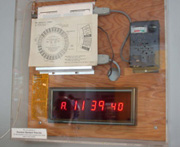


|
Misc.
|
Very, Very, Very
Precise Time
|
This device is a very
accurate clock in its own right. In addition, a microprocessor in
the clock uses information encoded in WWV's signal to synchronize
the clock with the NIST's cesium clock in Colorado. That cesium
clock keeps time to within one second in 370,000 years. It's difficult
to carry time from one place to another with great precision. The
station's short-wave signal carries the information about what time
it is, but the signal itself takes time to get from the transmitter
to the receiver. It's impossible to measure the delay exactly because
the signal bounces back and forth between the earth and the ionosphere.
However, the delay is never more than 1/100th of a second.
|

|







|